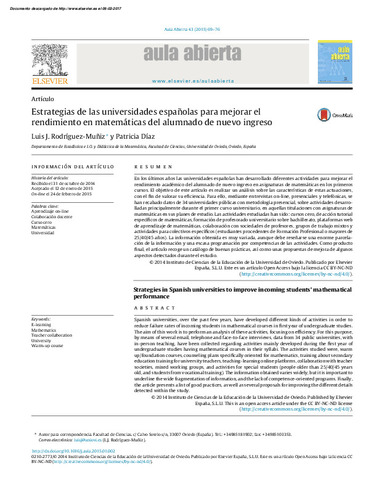Estrategias de las universidades españolas para mejorar el rendimiento en matemáticas del alumnado de nuevo ingreso
Otros títulos:
Strategies in Spanish universities to improve incoming students’ mathematicalperformance
Autor(es) y otros:
Fecha de publicación:
Editorial:
Elsevier
Versión del editor:
Citación:
Descripción física:
Resumen:
Spanish universities, over the past few years, have developed different kinds of activities in order to reduce failure rates of incoming students in mathematical courses in first year of undergraduate studies. The aim of this work is to perform an analysis of these activities, focusing on efficiency. For this purpose, by means of several email, telephone and face-to-face interviews, data from 34 public universities, with in-person teaching, have been collected regarding activities mainly developed during the first year of undergraduate studies having mathematical courses in their syllabi. The activities studied were, warm up/foundation courses, counseling plans specifically oriented for mathematics, training about secondary education training for university teachers, teaching-learning online platforms, collaboration with teacher societies, mixed working groups, and activities for special students (people older than 25/40/45 years old, and students from vocational training). The information obtained varies widely, but it is important to underline the wide fragmentation of information, and the lack of competence-oriented programs. Finally, the article presents a list of good practices, as well as several proposals for improving the different details detected within the study.
Spanish universities, over the past few years, have developed different kinds of activities in order to reduce failure rates of incoming students in mathematical courses in first year of undergraduate studies. The aim of this work is to perform an analysis of these activities, focusing on efficiency. For this purpose, by means of several email, telephone and face-to-face interviews, data from 34 public universities, with in-person teaching, have been collected regarding activities mainly developed during the first year of undergraduate studies having mathematical courses in their syllabi. The activities studied were, warm up/foundation courses, counseling plans specifically oriented for mathematics, training about secondary education training for university teachers, teaching-learning online platforms, collaboration with teacher societies, mixed working groups, and activities for special students (people older than 25/40/45 years old, and students from vocational training). The information obtained varies widely, but it is important to underline the wide fragmentation of information, and the lack of competence-oriented programs. Finally, the article presents a list of good practices, as well as several proposals for improving the different details detected within the study.
ISSN:
Colecciones
- Artículos [37548]
- Estadística e Investigación Operativa [295]
Ficheros en el ítem





